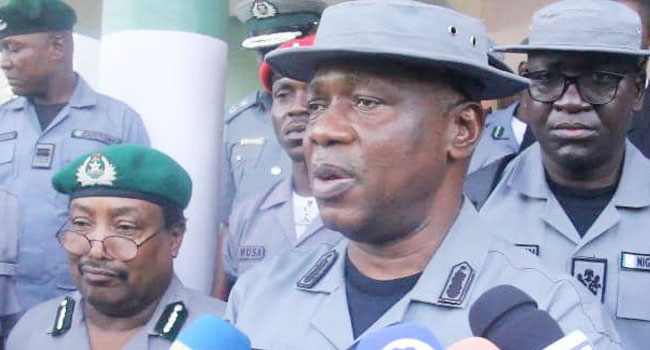In a renewed effort to decongest the Onne ports and streamline port operations, the Nigeria Customs Service (NCS) has launched a new automated system for the clearance of overtime cargoes.
The sensitisation exercise, held for stakeholders in Port Harcourt, introduced the digital platform, which is designed to accelerate the evacuation of long-stalled consignments, free up space for fresh imports, and enhance transparency and efficiency by reducing manual intervention and corruption.
The automated system allows stakeholders to submit and track applications remotely, eliminating delays caused by manual processes.
Doing so ensures that cargoes are moved out of terminals promptly over time, improving overall port efficiency and reducing dwelling time.
READ ALSO: NCAA Vows To Sanction Qatar Airways Over Alleged Passenger Mistreatment
Speaking at the sensitisation forum, Comptroller in charge of Special Duties Headquarters, Hadiel Hadison, who represented the Comptroller-General of Customs, emphasised that the digital platform aligns with the Comptroller-General’s vision to automate the entire customs process.
“Today’s event clearly shows how passionate the Comptroller-General of Customs is towards automating customs processes and procedures,” he stated.
“The overtime and auction processes have been analogous, while virtually all other parts of customs operations have been automated.
“To drive integrity and transparency, he deemed it fit to automate the overtime system. This is part of his innovative initiatives since he came on board,” Hadison stated.
He added that the system would enhance the integrity of the Service, particularly regarding import operations, stating that under the former Customs Management Act, importers had 90 days to clear goods before they became overtime cargo.
He also said the new Customs Act 2023 has reduced this period to 30 days. Recognising the transition challenges, the Comptroller-General generously extended additional months for importers to clear their consignments.
“This is a welcome development in customs operations. It will allow importers to continue with their business assignments and reduce dwelling time. The Comptroller-General also directed my team to educate stakeholders extensively on this platform.
“When stakeholders have sufficient understanding, the application process will be much easier,” Hadison noted.
Also addressing the forum, Customs Area Controller PH Area II Command Onne, Aliyu Alkali described the initiative as a turning point for Customs operations.
“The challenges of manual paperwork, abandoned cargoes, and lengthy clearance processes have historically slowed trade facilitation and economic activity.
Today, with the automated overtime cargo clearance and e-clearance system, we are demonstrating that Customs can be both a facilitator of trade and a guarantor of integrity,” he said.
Alkali emphasised that the system provides full transparency, allowing stakeholders to track and receive approvals online without unnecessary physical contact.
“Accountability and data integrity are central to this reform.
It is important for stakeholders to embrace this change, as it allows them to manage consignments remotely from their offices or even via mobile phones,” he added.
He also highlighted that the reform is backed by the Nigeria Customs Service Act 2023, which provides the legal framework for electronic processing, timelines for overtime cargo, and approved disposal methods.
The Act empowers the Service to handle overtime consignments after 120 days, including provisions for condemnation, auctions, or other disposal methods.
The sensitisation workshop was divided into two sessions, one for stakeholders and another for officers.
Chief Superintendent of Customs, Abubakar Abdulkadir, provided a general overview of the system, while Assistant Comptroller of Customs, Suleiman Mohammed, trained participants on the ICT process involved in automating overtime cargo clearance.
The event concluded with a question-and-answer segment, during which officers addressed inquiries raised by stakeholders.
The workshop was attended by senior customs officials, businessmen, and other relevant stakeholders, reflecting the NCS’s commitment to ensuring all parties understand and benefit from the new system.
This initiative is part of the Comptroller-General’s broader vision to modernise customs operations, enhance efficiency, and maintain integrity across all areas of import and export management.





